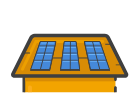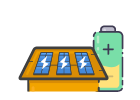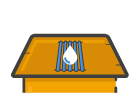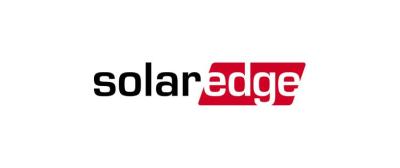What is a Solar Inverter?
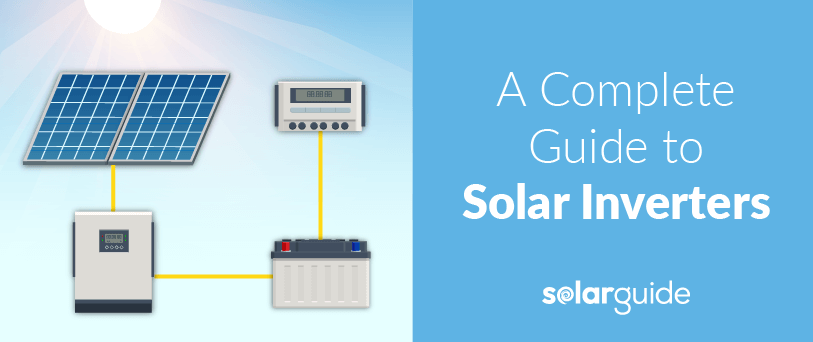
Are you considering solar power for your home in the UK? Have you wondered about the cost of solar inverters and whether they are worth the investment? Look no further! In this comprehensive guide, we will walk you through everything you need to know about solar inverters in the UK in 2023.
Solar power has become an increasingly popular choice for homeowners, and for good reason. Not only does it offer a renewable and clean energy source, but it also helps reduce electricity bills and contributes to a greener environment.
Solar inverters play a crucial role in any solar power system. They are responsible for converting the direct current (DC) generated by solar panels into alternating current (AC) that can be used to power your home. But how much do solar inverters cost? Are they worth the investment? These are common questions that homeowners often ask.
But before we delve deeper, we have great news for you if you’ve been spending hours researching on the internet, trying to find the best solar inverter installer, and comparing prices. Our service is designed to remove the stress and hassle from your search. We allow you to compare prices and save by offering up to 4 solar quotes from our trusted and reliable installers within 48 hours.
Imagine the relief of having the best solar inverter or solar panel installation experts handpicked for you, ensuring that you get the highest quality products and services. No more endless scrolling through websites or uncertain choices. With our service, you can make an informed decision with ease.
What’s even better? All our quotes come completely free and without any obligation. Yes, you read that right. You can examine your options, compare prices, and evaluate the best solution for your home without any cost or commitment. So, why wait? Click the button below to get started.
Get FREE Solar Quotes
What is a solar inverter?
A solar inverter is a vital segment of a solar power system that converts the direct current (DC) electricity produced by solar panels into alternating current (AC) electricity, which is suitable for powering your home appliances and feeding back excess electricity into the grid. In simple terms, the bridge connects your solar panels to your household electrical system.
Why do you need a solar inverter? Well, solar panels generate electricity in the form of direct current (DC), which is different from the alternating current (AC) used in our homes. To utilise the electricity produced by solar panels, it needs to be converted into AC. That’s where the solar inverter comes into play.
How does a solar inverter work?
The process of how a solar inverter works can be split into a few key steps:
- Conversion: When sunlight strikes the solar panels, they generate DC electricity. The solar inverter takes this DC electricity and converts it into AC electricity, which can be used to power your home.
- Optimisation: Solar inverters are equipped with maximum power point tracking (MPPT) technology. This technology allows the inverter to constantly monitor the output of the solar panels and adjust the electrical characteristics to maximise the amount of electricity produced. This ensures you get the most out of your solar panels, even in varying sunlight conditions.
- Synchronisation: The solar inverter synchronises its AC electricity with the grid’s voltage and frequency. This is important because it allows the surplus electricity induced by your solar panels to be seamlessly fed back into the grid, reducing your reliance on traditional power sources and potentially even earning you credits or compensation through net metering programs.
- Monitoring and safety: Many modern solar inverters come with built-in monitoring systems that allow you to track the performance of your solar power system. They also provide safety features such as ground fault protection, which ensures that the system shuts down in case of a fault, protecting you and your home.
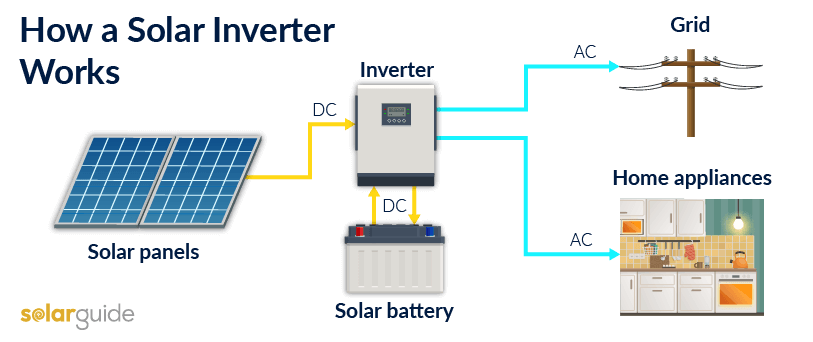
Solar panel inverter costs: Prices in the UK
When considering a solar power system for your home, one crucial factor to consider is the cost of the solar panel inverter. The price of a solar inverter can rely on factors such as the size of the system and the type of inverter chosen. To help you with the best idea of the average prices in the UK, take a look at the table below:
| Size of system | Hybrid solar inverters | String solar inverters | Micro solar inverters |
|---|---|---|---|
| Small (1-5 kW) | £800 – £1,200 | £500 – £900 | £600 – £1,509 |
| Medium (5-10 kW) | £1,200 – £2,000 | £900 – £1,500 | £1,509 – £3,018 |
| Large (10+ kW) | £2,000 – £3,500 | £1,500 – £2,500 | £3,018+ |
Note: These prices are just estimates and vary on factors such as the brand, features, and installation requirements. But for the Micro solar inverter, a unit typically costs around £90 – £100. meanwhile, for a 3.5 kW solar panel system comprising 10 panels, you will need to spend either £890 or £1,510 for 10 microinverters.
With the price above, we still understand that finding the right solar panel inverter at the best price can be daunting. That’s why our service is designed to simplify the process for you. We can connect you with our network of professional solar panel installers in your area, and all you have to do is fill out a simple form. Within 48 hours, you’ll receive amazing quotes for solar panel inverters tailored to your needs.
The best part? Our service is absolutely free to use. You are not obligated to accept any of the quotes you receive because we believe in providing you with the best information and choices you need to make an informed decision. So, if you’re curious about solar panel inverter prices in the UK, don’t hesitate to click the button below to get started.
Get FREE Solar Quotes
Types of solar panel inverters
Understanding the different types of solar panel inverters can help you decide when to choose the right inverter for your solar power system. Let’s explore the most popular types: hybrid solar inverters, string solar inverters, and micro solar inverters.
String solar inverters
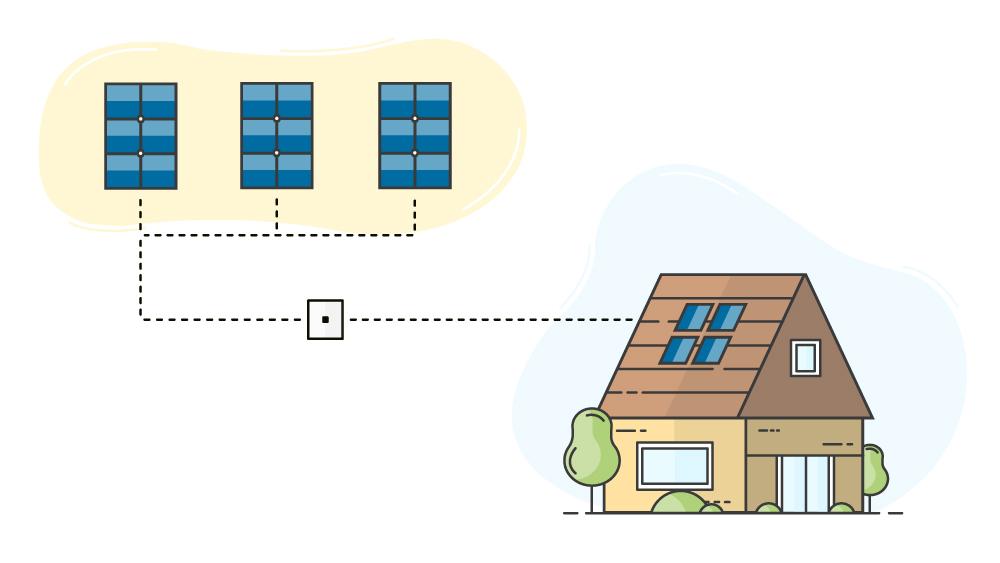
String solar inverters are the most common type of inverters used in solar power systems. They connect multiple solar panels in a series (string) and convert the combined DC electricity into AC electricity.
Pros of string solar inverters:
- Cost-effective: String inverters are generally more affordable than other types, making them popular for residential and commercial installations.
- Simple installation: The installation process for string inverters is straightforward, making it easier and faster for installers to set up the system.
- Wide availability: String inverters are widely available in the market, offering various options from different manufacturers.
Cons of string solar inverters:
- Potential performance issues: In a string inverter setup, if one solar panel in the string is shaded or underperforming, it can affect the performance of the entire string.
- Limited design flexibility: Since all the panels in a string are connected, they need to be oriented and positioned similarly, limiting the flexibility of the system design.
Micro solar inverters
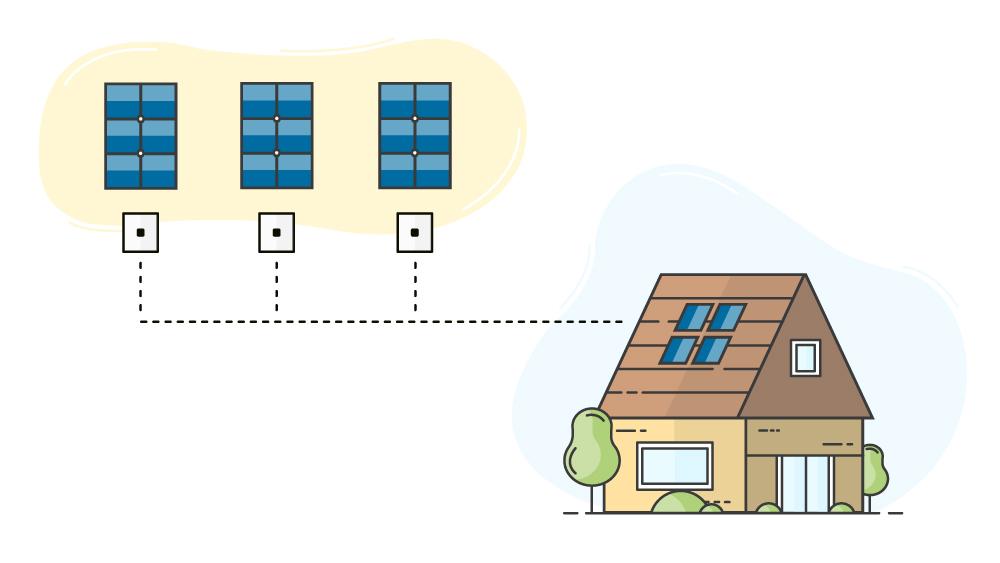
Micro solar inverters are installed on each individual solar panel, converting the DC electricity into AC electricity at the panel level. This allows for greater flexibility and optimisation of each panel’s performance.
Pros of micro solar inverters:
- Panel-level optimisation: Micro inverters ensure that each panel operates independently and at its maximum solar panel efficiency, even if other panels are shaded or underperforming.
- Enhanced safety: With micro inverters, the DC voltage is converted to AC voltage right at the panel, minimising the risk of high-voltage DC power on your roof.
- Monitoring capabilities: Micro inverters often come with built-in monitoring systems that let you track the performance of each panel individually, ensuring optimal system performance.
Cons of micro solar inverters:
- Higher upfront cost: Micro inverters are generally more expensive than string inverters due to the need for individual inverters for each panel.
- Complex installation: Installing micro inverters requires careful wiring and integration with each panel, which can be more time-consuming and labour-intensive.
Hybrid solar inverters
Hybrid solar inverters are versatile and efficient inverters that offer a combination of features. They convert DC electricity from solar panels into AC electricity for immediate use and allow you to store excess energy in solar batteries for later use. This means you can harness solar power even when the sun is not shining.
Pros of hybrid solar inverters:
- Energy storage capability: With hybrid inverters, you can store excess energy in solar batteries, providing you with a reliable backup power source during grid outages.
- Optimised self-consumption: Hybrid inverters allow you to maximise self-consumption of the solar energy you generate, reducing reliance on the grid and lowering your electricity bills.
- Grid interaction: Hybrid inverters can seamlessly interact with the grid, allowing you to sell excess energy back to the utility company, potentially earning you credits through net metering programs.
Cons of hybrid solar inverters:
- Higher upfront cost: Hybrid inverters are generally more costly than other types due to their advanced functionality and energy storage capability.
- Complex installation: Installing a hybrid solar inverter requires additional components, such as solar batteries, which may increase the complexity and cost of installation.
In summary, the choice of solar panel inverter depends on the various factors above. So, are you ready to find the perfect solar panel inverter for your solar power system? Our service at SolarGuide will connect you with up to 4 professional installers for the best selection process and provide you with an accurate quote. Simply fill in our simple form to get started, and remember, our service is free to use, and there is no obligation to accept any of the quotes you receive.
Get FREE Solar Quotes
What size solar PV inverter do I need?
Determining the right size of a solar PV inverter is a crucial step in designing a solar energy system. The size of the inverter you need depends on the size of your solar panel installation, as it should be able to handle the maximum power output of your panels. Let’s explore the recommended inverter sizes based on the size of the solar panel installation:
| Solar Panel Installation Size | Recommended Inverter Size |
|---|---|
| 2kW | 2kW – 2.5kW |
| 3kW | 3kW – 3.8kW |
| 4kW | 4kW – 5kW |
| 5kW | 5kW – 6.25kW |
| 6kW | 6kW – 7.5kW |
| 12kW | 12kW – 15kW |
Note. An undersized inverter may not be able to handle the maximum power output of your solar panels, leading to energy losses. On the other hand, an oversized inverter may not operate efficiently at lower power levels, resulting in decreased performance.
When determining the size of your solar PV inverter, consider factors such as the expected power output of your solar panels, shading issues, and future expansion plans. By getting our quote, a professional installer like SolarGuide Network can help you assess these factors and recommend the most suitable inverter size for your specific needs.
What is the best solar inverter in the UK
There are several factors to consider, including costs, performance, reliability, and brand reputation. While the “best” inverter may vary based on individual preferences and specific installation requirements, here are some top brands known for their quality solar panel inverters:
| Brand | Pros | Cons |
|---|---|---|
| SMA Solar Technology | – Excellent performance and reliability | – Higher upfront cost |
| SolarEdge | – Power optimization for shaded conditions | – Additional cost for power optimisers |
| Fronius | – High efficiency and advanced grid management | – May require additional components for certain features |
| Enphase Energy | – Panel-level optimisation and reliable performance | – Higher upfront cost |
| Huawei | – High efficiency and intelligent features | – Limited presence and brand recognition in the market |
- SMA Solar Technology:SMA is a renowned brand in the solar industry, offering a wide range of high-quality inverters. They are known for their exceptional performance, reliability, and advanced features. SMA inverters often come with comprehensive monitoring capabilities and excellent warranties.
- SolarEdge:SolarEdge is another well-respected brand specialising in power optimisers and string inverters. Their inverters are known for their advanced power optimisation, allowing maximum energy production even in shading or uneven panel conditions. SolarEdge inverters also come with robust monitoring capabilities and smart energy management features.
- Fronius:Fronius is a trusted name in the solar industry, offering a diverse range of inverters suitable for residential and commercial applications. Fronius inverters are known for their high efficiency, durability, and advanced grid management features. They also come with reliable monitoring options and excellent customer support.
- Enphase Energy:Enphase Energy is a leading manufacturer of microinverters known for their panel-level optimisation and monitoring capabilities. Enphase microinverters allow for maximum energy production, even in partially shaded conditions. They offer exceptional reliability and come with user-friendly monitoring systems.
- Huawei:Huawei is a global technology company that has advanced offerings in the solar inverter market. Their inverters are known for their high efficiency, reliable performance, and intelligent features. Huawei inverters often come with smart grid interaction capabilities and advanced monitoring systems.
While these brands are recognised for their quality and performance, it’s important to note that the “best” solar inverter for your specific needs may depend on factors such as budget, installation requirements, and desired features.
Should I get an inverter for solar panels?
Yes, getting an inverter for your solar panels is essential for harnessing the full potential of solar energy. It allows you to convert DC electricity into usable AC electricity, maximise energy utilisation, and feed excess energy back into the grid. Inverters also provide monitoring and safety features, ensuring your solar power system’s efficient and safe operation.
But the important question here is how you go about the installation. Don’t worry; Solar Guide has got you covered. Our service connects you with professional installers who can help you. With our service, you can relax and avoid countless hours of research that may not provide you with the best result. Save your time by simply filling in the form below. You can get in touch with up to 4 trusted installers, who will provide you with amazing quotes within 48 hours.
It’s important to mention that our service is completely free to use, and there is no obligation to accept any of the quotes you receive. We believe in empowering you with information and options, letting you make an informed decision without any extra pressure. Click the button below and start now.
Get FREE Solar Quotes
Frequently asked questions
How long do solar inverters last?
The lifespan of solar inverters varies depending on the brand, quality, and usage. On average, a well-maintained solar inverter lasts 10 to 15 years. However, some high-quality inverters have been known to last up to 20 years or more.
What type of solar inverter is the best for solar panels?
The best type of solar inverter for solar panels depends on various factors, including system size, installation setup, and individual preferences. Three common types of solar inverters are string inverters, microinverters, and hybrid inverters.
Does a solar inverter need a battery?
No, a solar inverter does not necessarily require a battery. Solar inverters convert DC solar energy into AC electricity. Suppose your goal is to quickly use solar energy or feed extra energy into the grid. A solar inverter is enough. However, you may want to conserve energy or have backup power during grid interruptions. Add a solar battery and be mindful of solar battery prices.
What is the benefit of solar inverters?
Solar inverters offer several benefits in a solar power system. These include converting DC to AC electricity, energy optimisation, grid interaction, monitoring, and safety.
Find local, MSC certified Solar Installers
Start your quote
Find local, MSC certified Solar Installers






